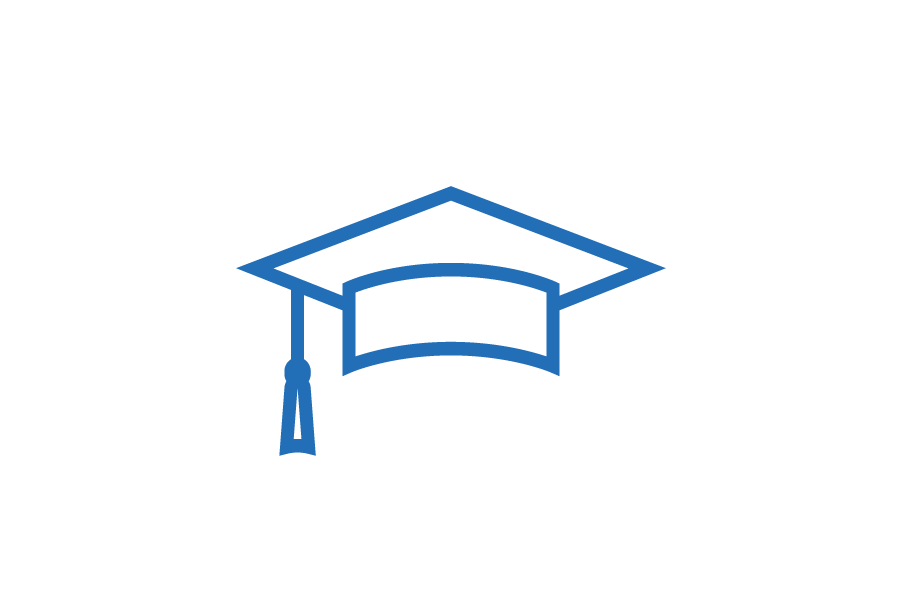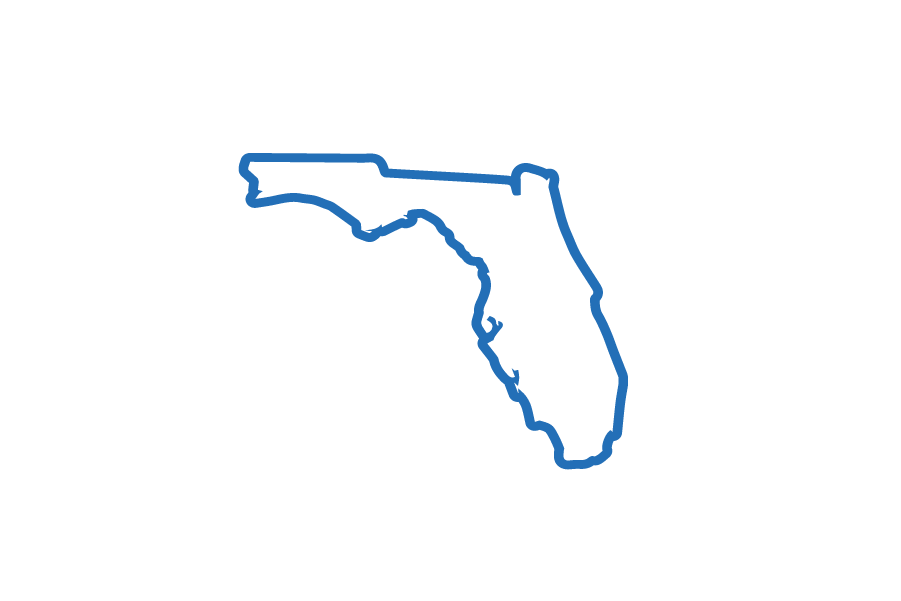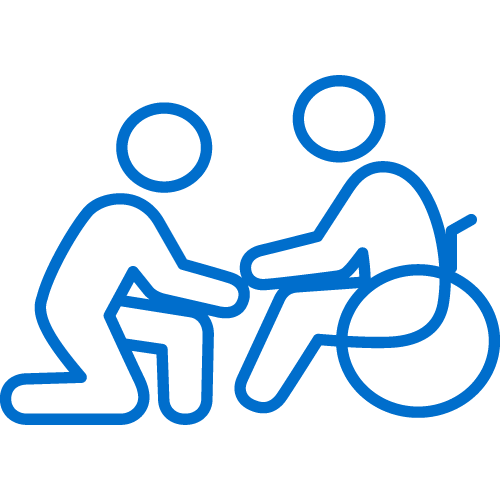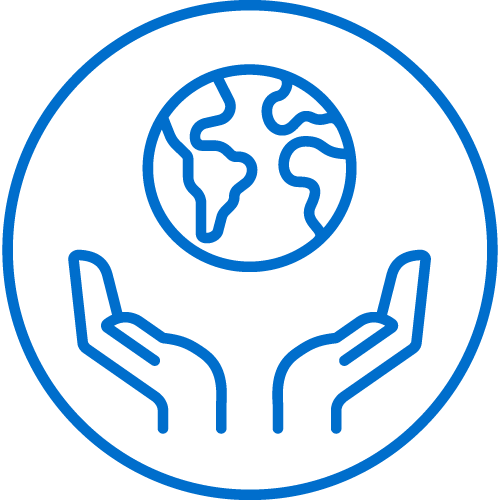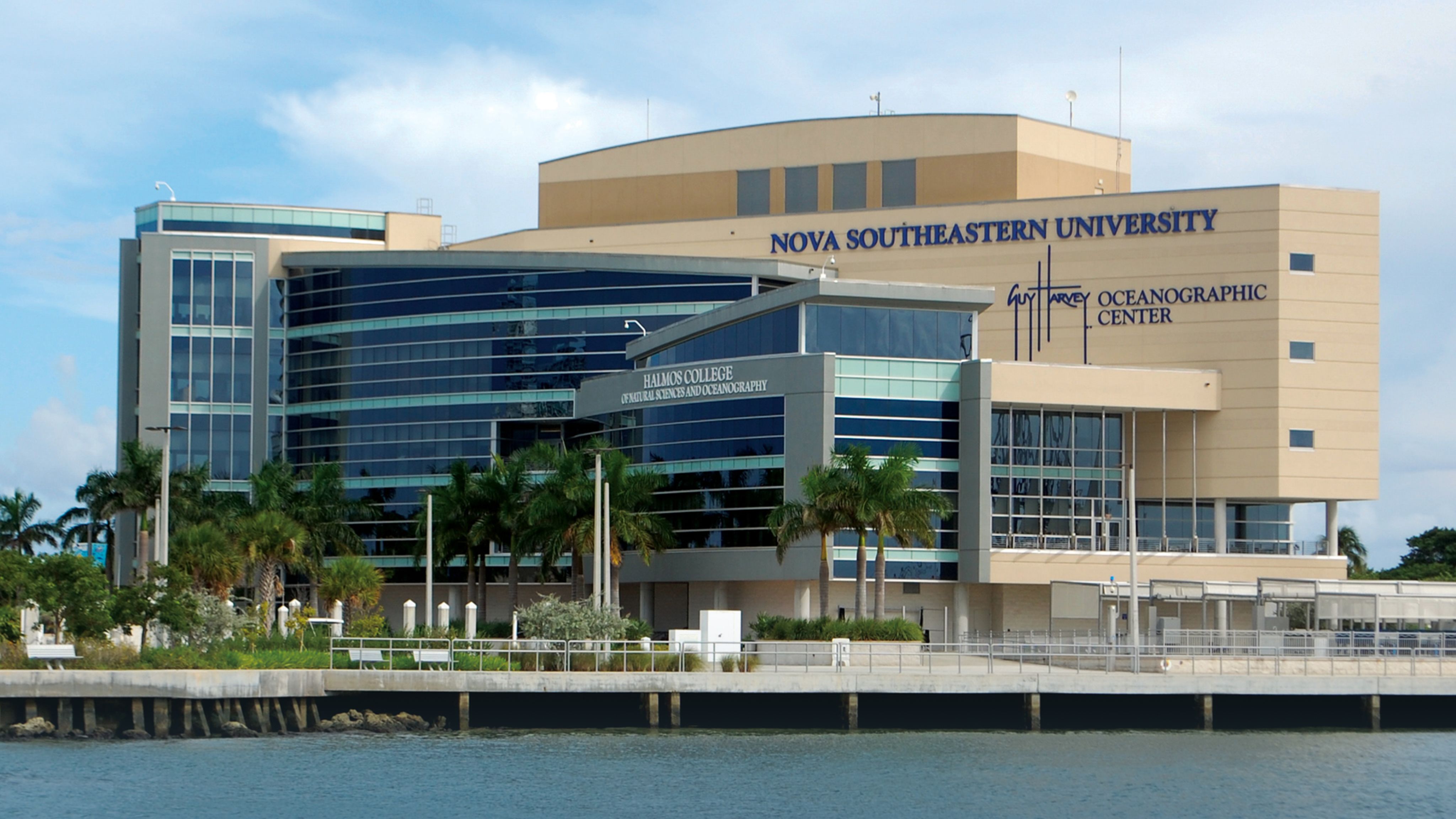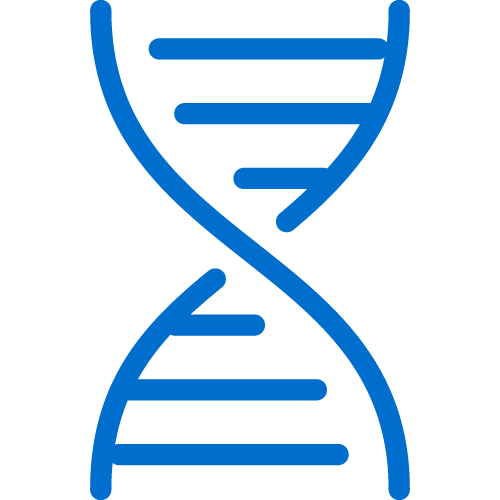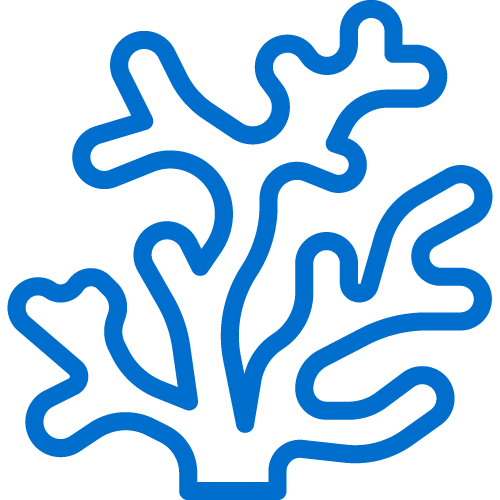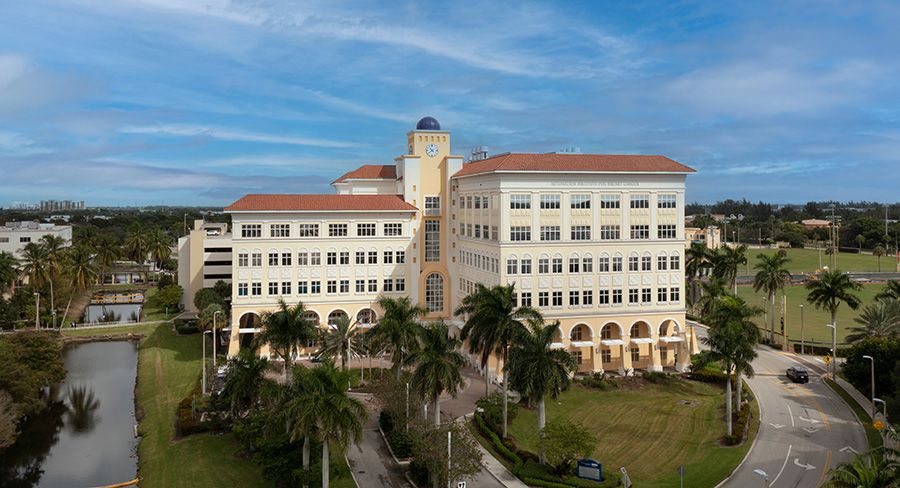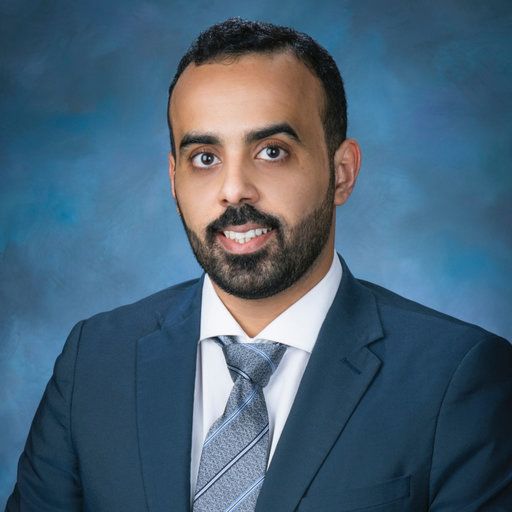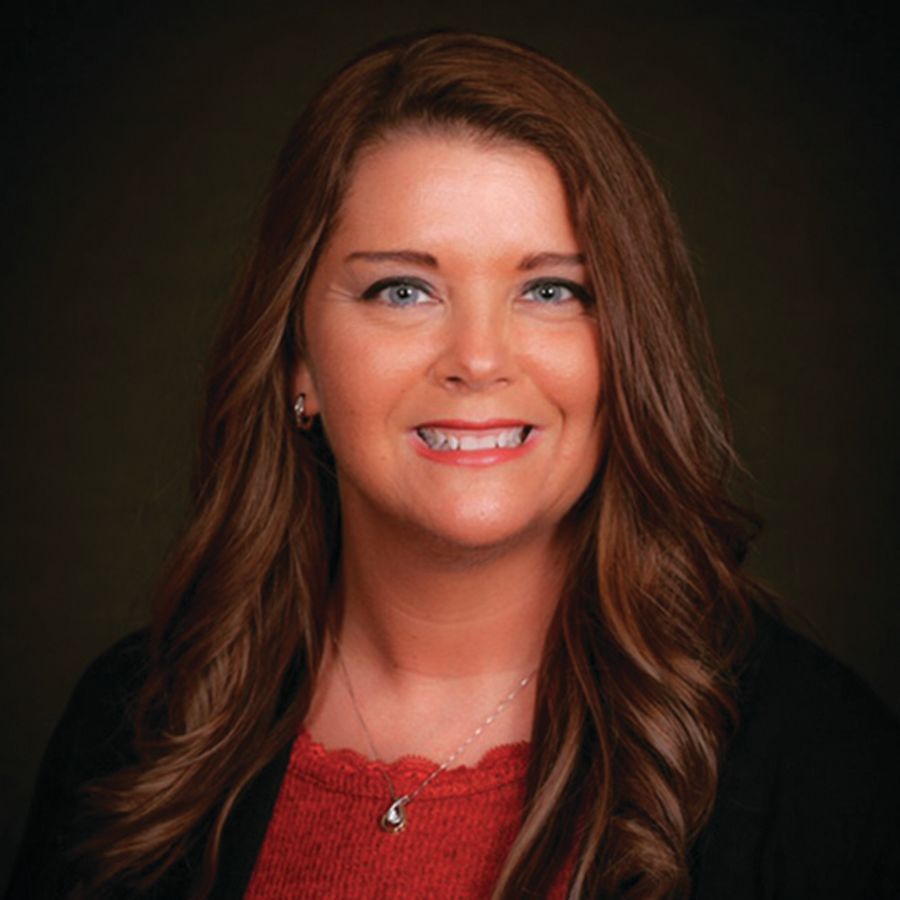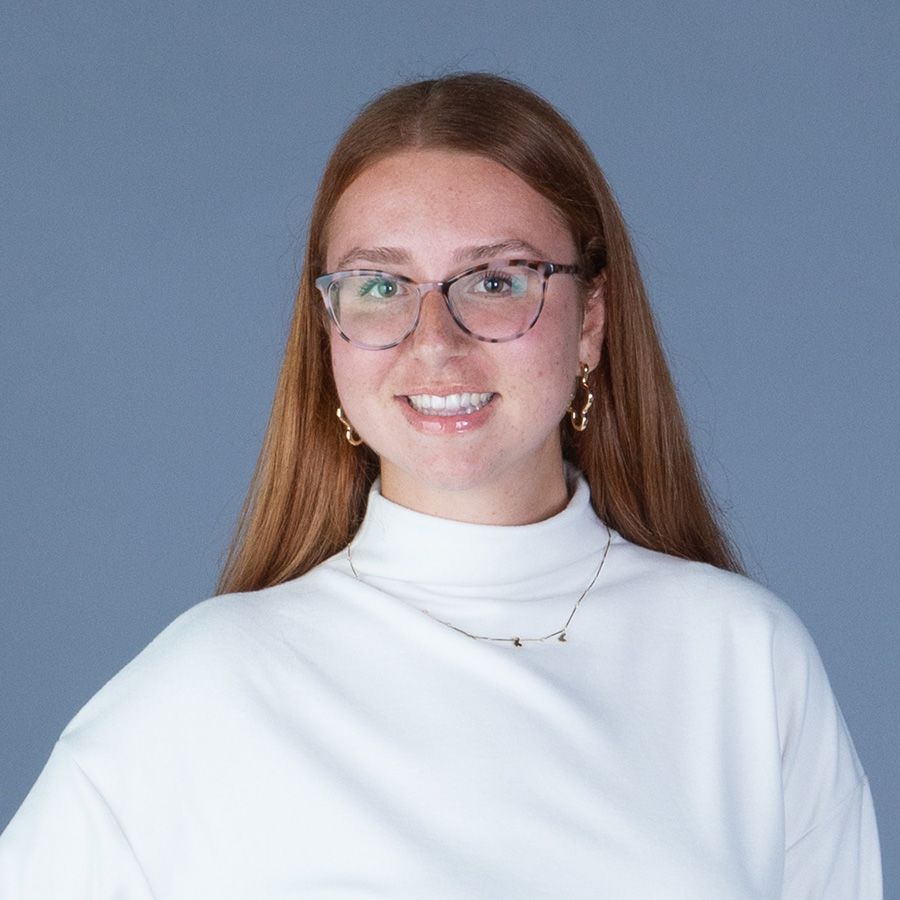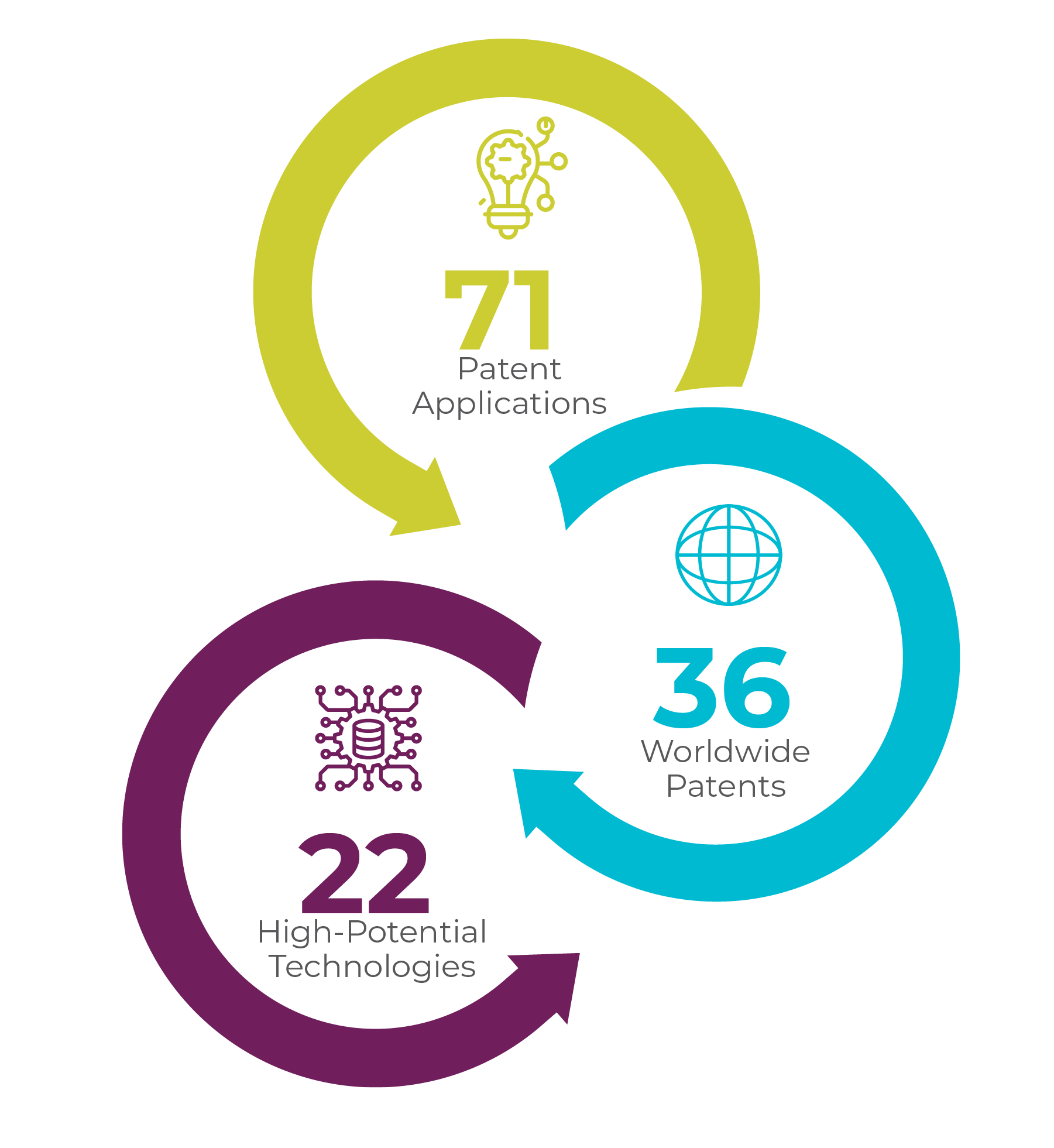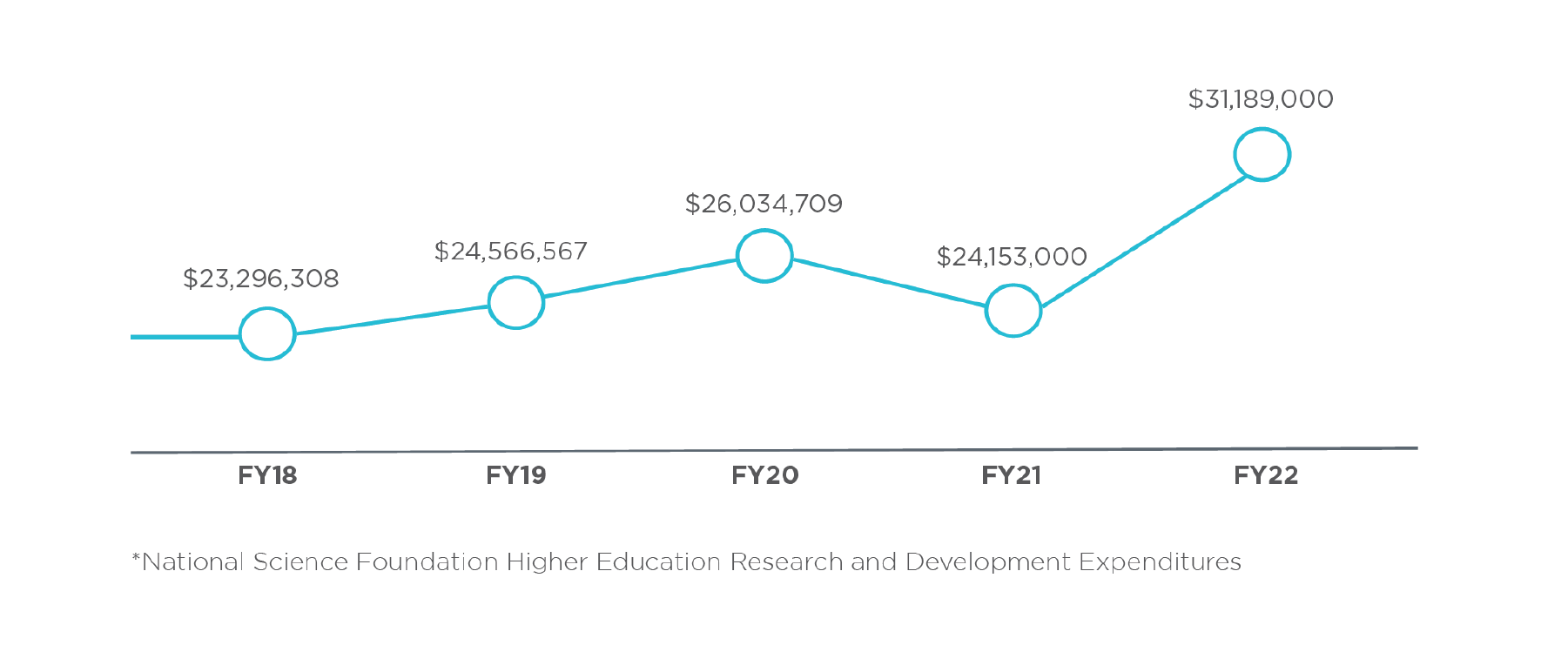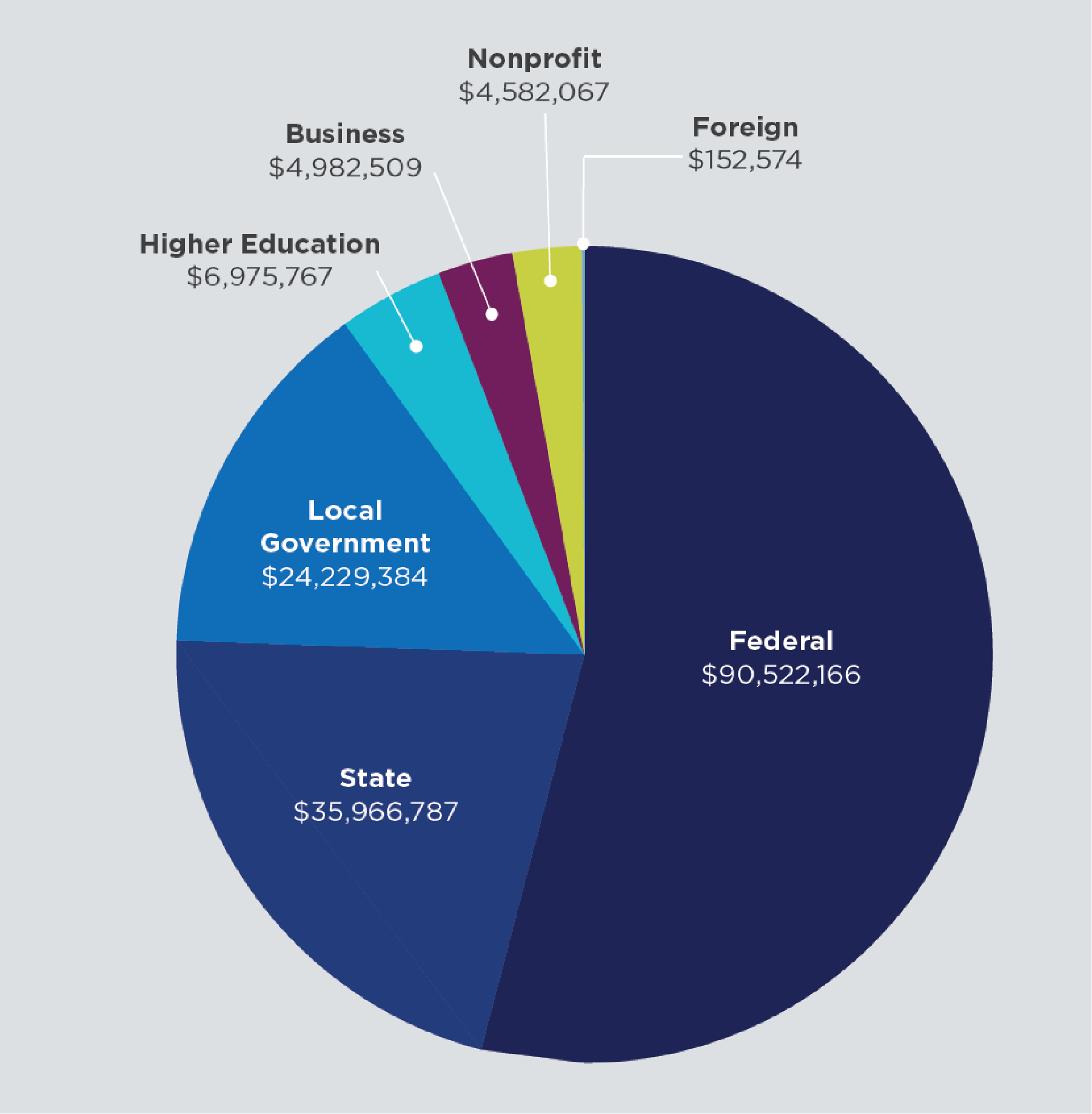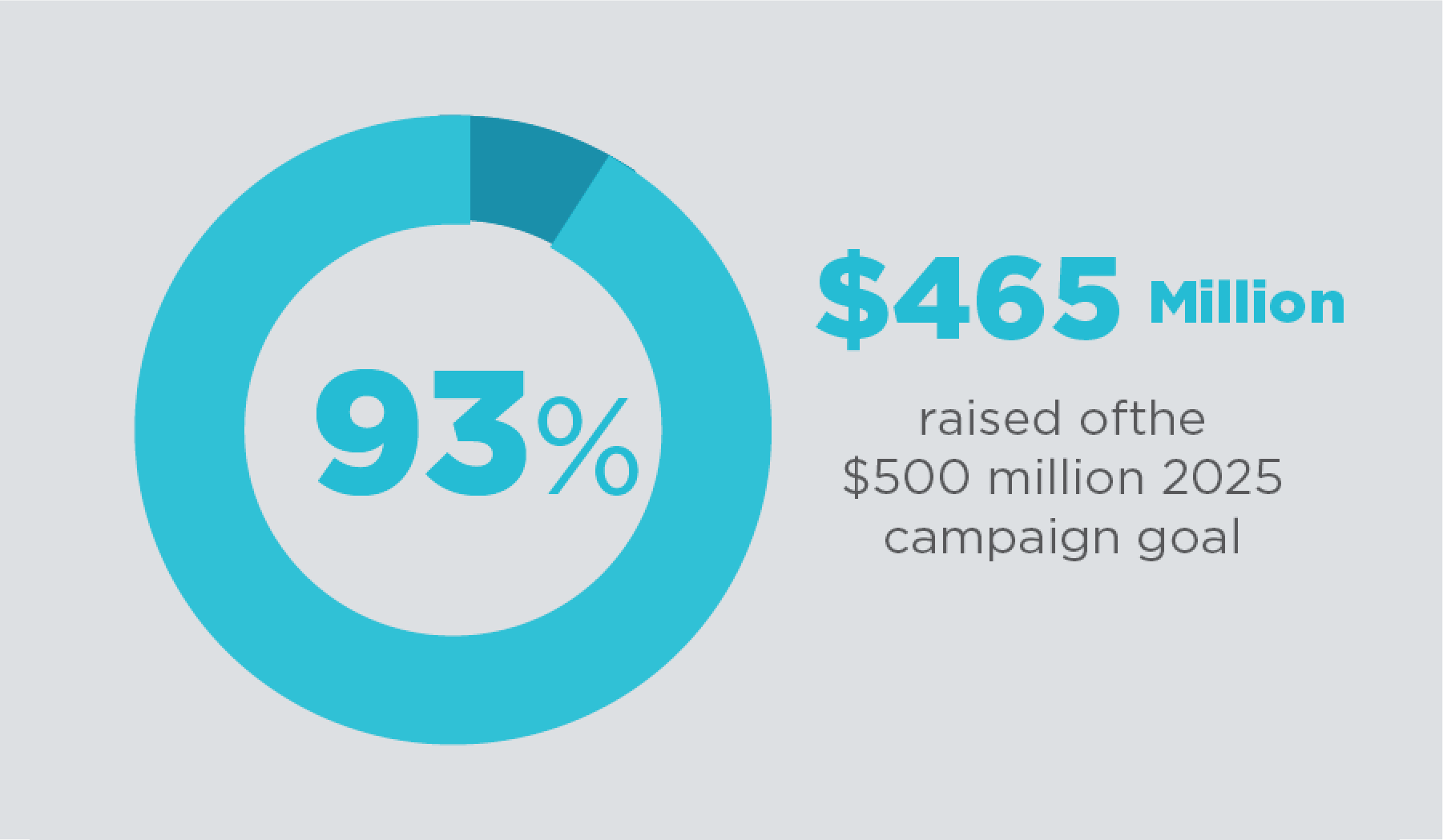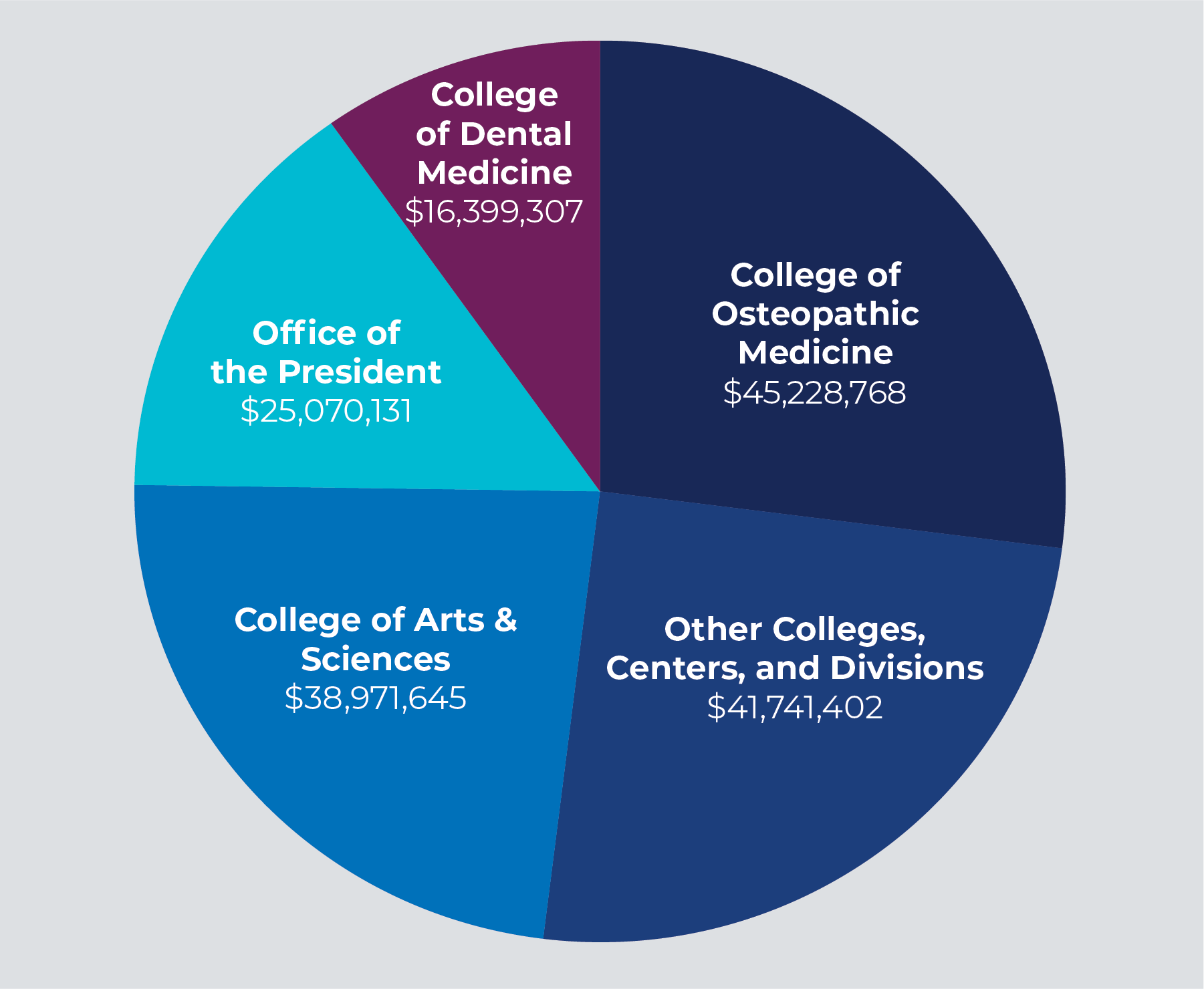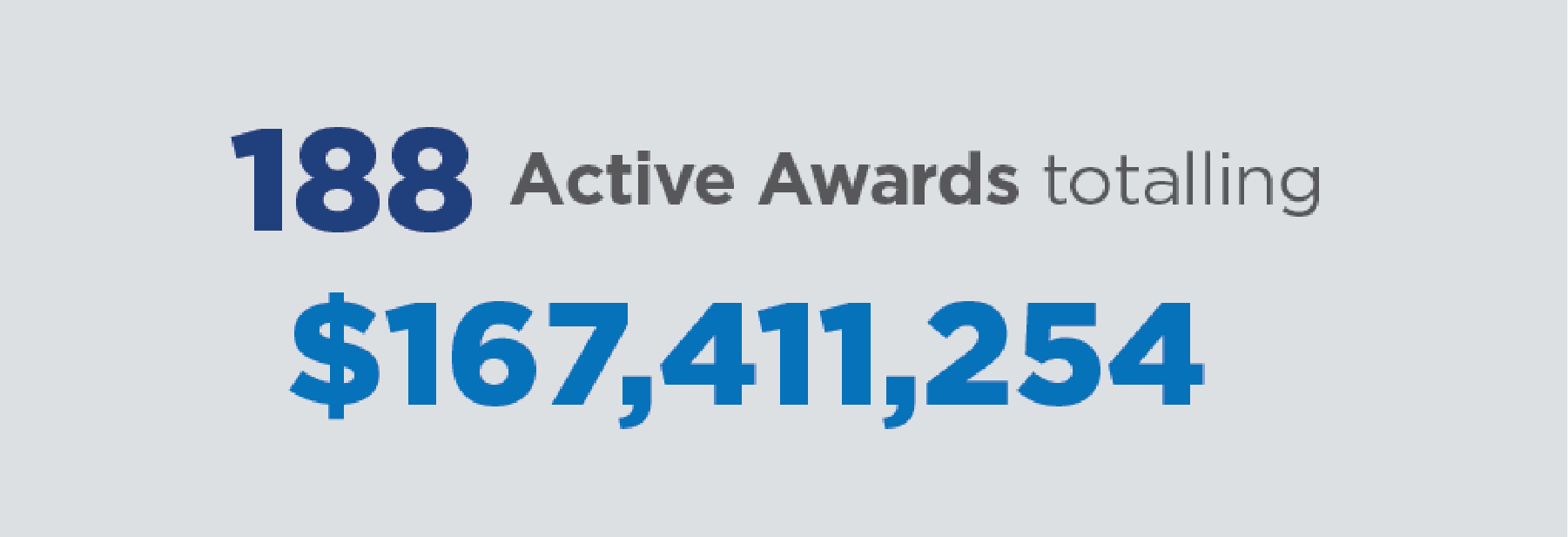ELEVATE. EXCITE. ENRICH.
Where Research Thrives
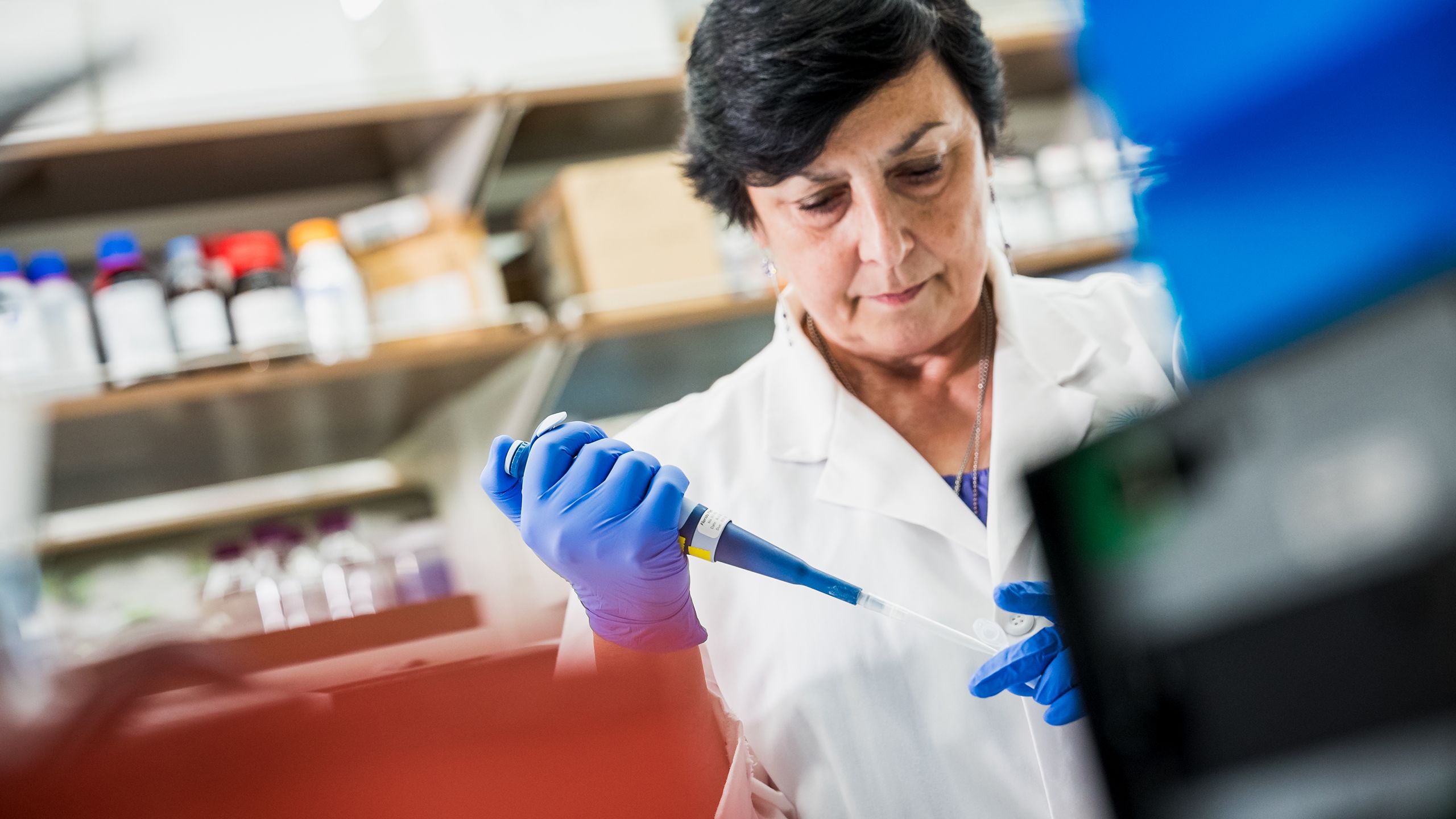
NOVA SOUTHEASTERN UNIVERSITY STRIVES FOR CARNEGIE R1 RESEARCH DESIGNATION
With our most recently published NSF Higher Education Research and Development data reaching $31.2 million in 2022, we anticipate achieving the $50 million threshold soon and are actively working toward that goal. Part of the effort is to account for all NSU’s investments in research. Increasing our expenditures will meet one of the two criteria required for NSU to earn the R1 “very high research activity” designation from the Carnegie Classification of Institutions of Higher Education. NSU also surpasses the second criteria by awarding more than 422 research or scholarship doctorates in one year. The new Carnegie rankings are expected to be released in 2025.
NSU AT-A-GLANCE
$31.2 million research and development expenditures in FY22
422 doctoral degrees awarded in 2023
20,877 undergraduate, graduate, and professional students
11 campuses
Elevating Our Impact
It is our pleasure to share the 2024 Nova Southeastern University (NSU) Research Report produced by NSU’s Division of Research and Economic Development. This report is a culmination of the research innovation and advancement championed by NSU faculty, staff, and student researchers.
NSU researchers and students improve patient care, discover new treatments, reduce mental health disorders, examine the forces that have an impact on our oceans, and more. We are committed to leading-edge performance across all domains of our research, including health care, biotechnology, life sciences, environment, and social sciences.
Our impact on society grows with each new discovery.
This year, NSU is approaching a major milestone in our history, one that speaks volumes about our collective dedication and commitment to research at the highest level. We are working toward achieving R1 status to open new opportunities for collaboration and funding for faculty and students of all levels, in all disciplines.
This pivotal moment will mark the culmination of decades of building a research university, and a rigorous two-year effort to better recognize NSU’s investment in our research enterprise. This impending recognition underscores the tireless efforts of every individual in our NSU community to propel NSU to the forefront of research excellence.
We are excited to share the extraordinary work of our faculty and staff highlighted here and on our website. Perhaps you’ll be inspired to collaborate with us and make a positive impact on our world.
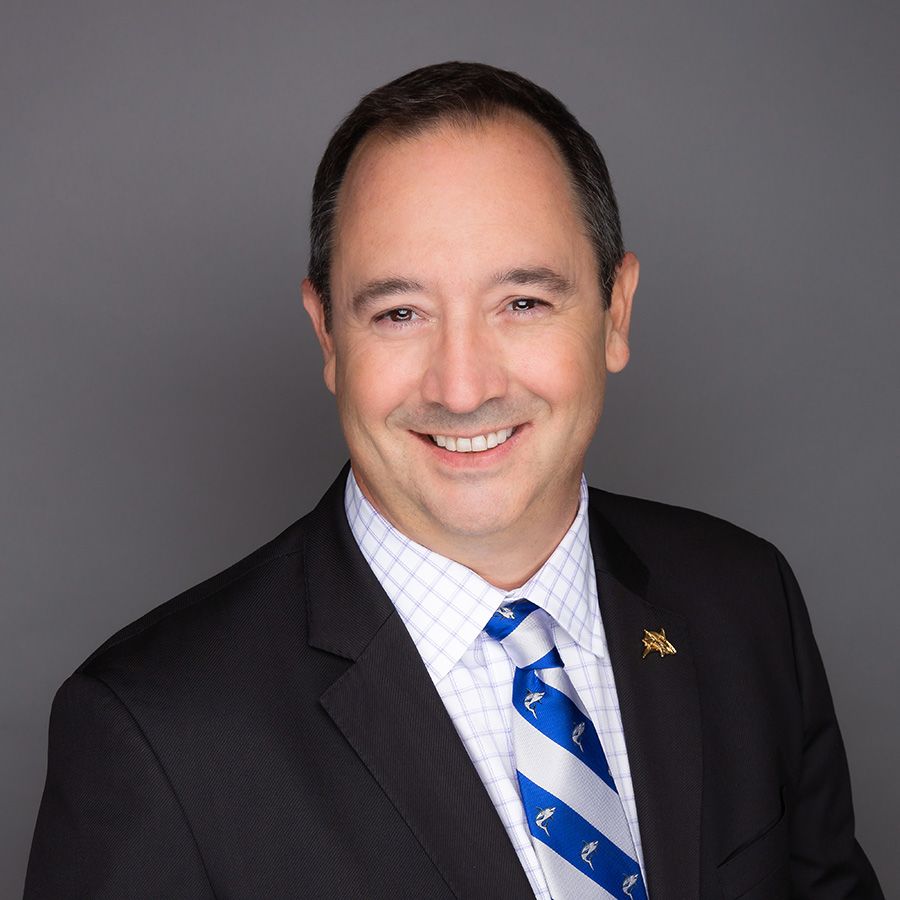
KEN DAWSON-SCULLY, PH.D.
Senior Vice President for Research and Economic Development and Associate Provost
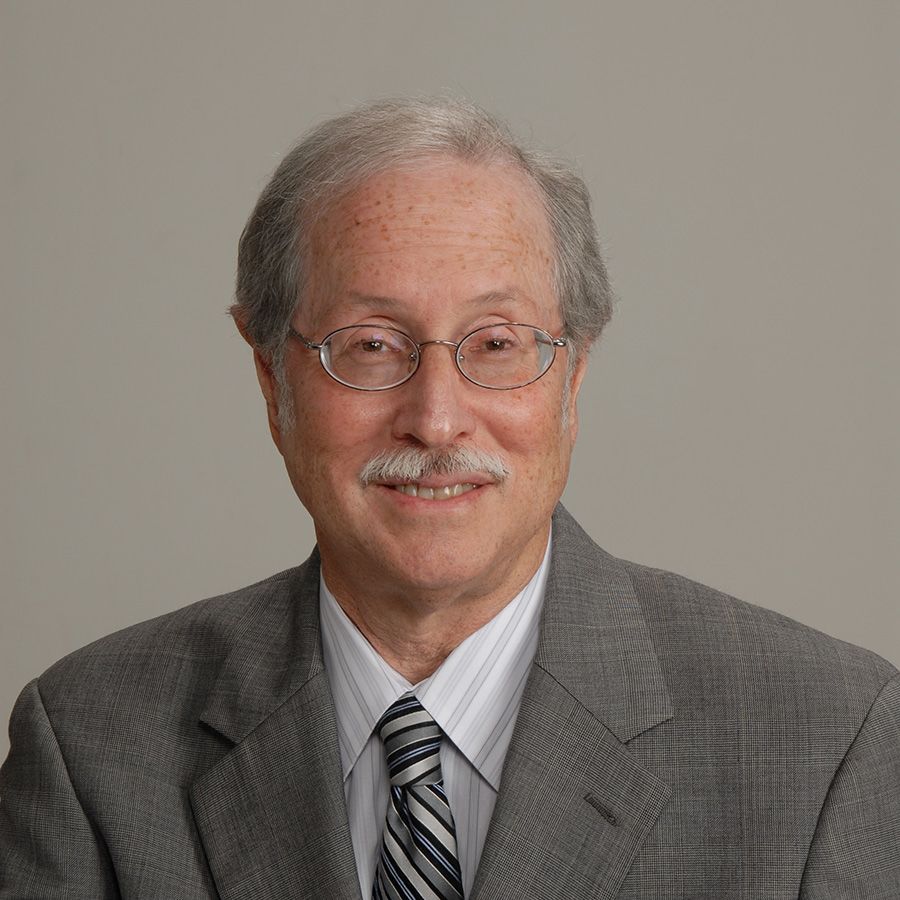
GARY S. MARGUILES, SC.D.
Vice President for Research
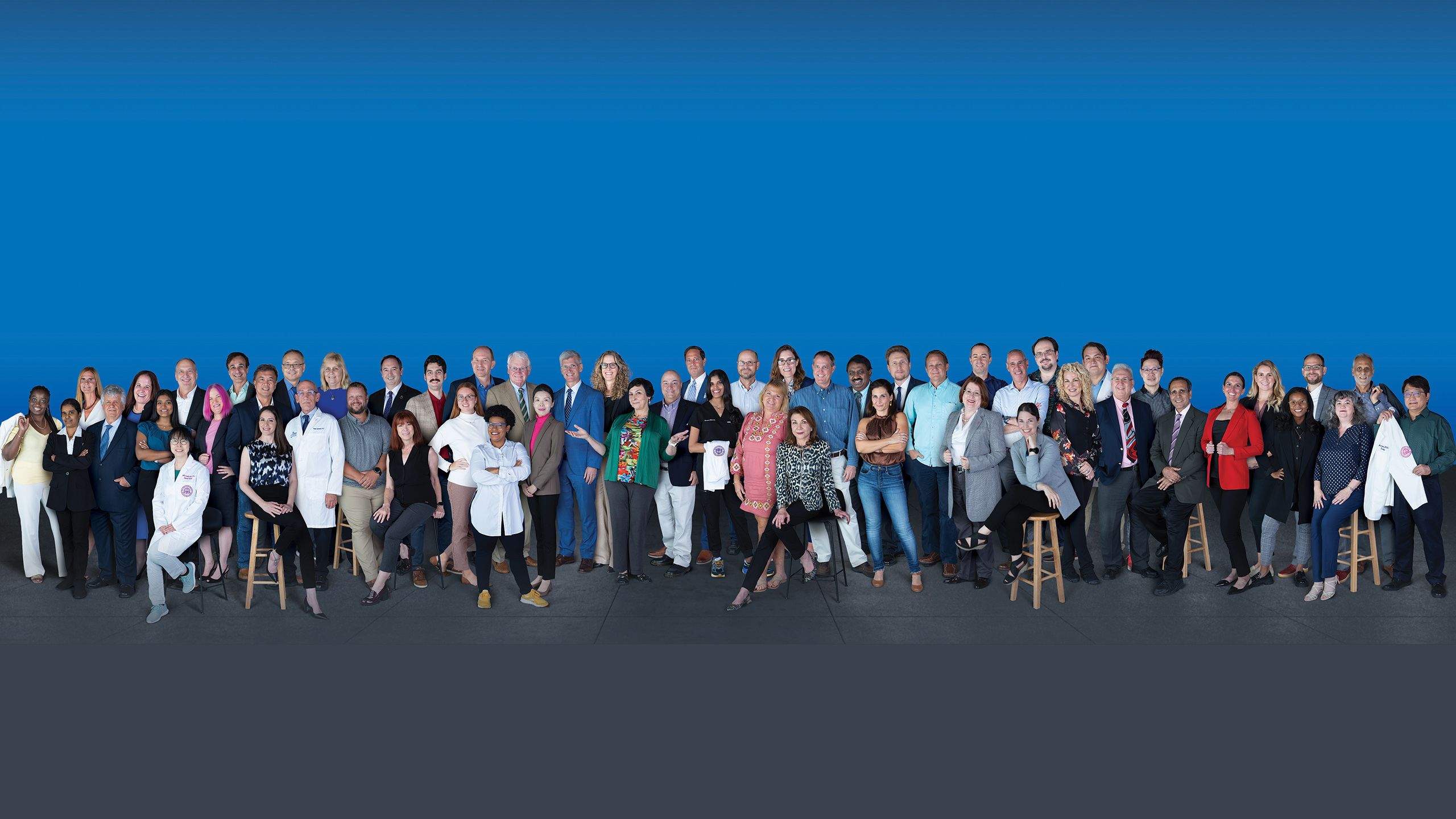
Who Are We?
NSU researchers are curious explorers, collaborators, and problem-solvers.
From making major contributions in marine science and the environment to medical breakthroughs in cancer research and brain disease, NSU researchers are committed to making a lasting impact on the world.
Driven by a desire to improve lives globally, NSU researchers expand the frontiers of knowledge in areas such as health, brain development, ecosystems, community, cybersecurity, and more.
They dive deep in their respective fields and reach across disciplines. This collaboration sparks discovery and finds evidence-based solutions to the world’s problems.
As mentors and role models to our students, our researchers enrich the next generation of scholars and thinkers. This combined power of education and research creates a brighter future for us all.
- Largest private, not-for-profit institution in the U.S. that meets the U.S. Department of Education’s designation as a Hispanic-serving institution
- More than 70 medical, dental, and psychological clinics with a large portion serving low-income and uninsured patients
- Classified as a “Research Doctoral-Professional Dominant” R2 university by the Carnegie Foundation
- One of 59 R2 universities nationwide awarded Carnegie’s Community Engagement Classification
NSU DISTINCTIONS
Florida’s Largest Private Research University
3 Research Institutes Focused on Cancer Prevention and Treatment
93%–Research 2025 Campaign Goal ($465 Million of $500 Million Goal)
>$167,000,000 University-Wide Sponsored Funding
Every Discovery Is a Step Toward Improving the Human Condition
From Bench Research to Clinical Trials, and Treatment to Cures
ARE PFAS DEFORMING TEETH IN KIDS?
Known as forever chemicals because they never fully break down in the environment, PFAS (per- and polyfluoroalkyl substances) are found in oceans, groundwater, drinking water, and food. Could these toxins be causing enamel to thin? Maiko Suzuki, D.D.S., Ph.D., an associate professor at the NSU College of Dental Medicine, is investigating the molecular mechanisms of how PFAS affect the formation of teeth.
BY THE NUMBERS: 12.9% of children affected globally by enamel defects in first molars and incisors
THE BACTERIA BATTLE
When bacteria resist antibiotics, infections worsen. Robert Smith, Ph.D., associate professor at the NSU Cell Therapy Institute and the NSU Dr. Kiran C. Patel College of Allopathic Medicine, has discovered how these organisms communicate with each other in a wound. If this communication can be interrupted, solutions may be found to heal infections.
BY THE NUMBERS: 2.8 million antibiotic-resistant infections in the U.S., according to the Centers for Disease Control
SOLVING THE MOST COMMON EYE DISORDER IN CHILDREN
Amblyopia, also known as lazy eye, occurs when the eye and brain don’t properly work together. Roger W. Li, O.D., Ph.D., an associate professor at the NSU College of Optometry, is testing whether immersive video games could help children restore stereo vision, the ability to perceive depth and three-dimensional structures by processing visual information from both eyes.
BY THE NUMBERS: 1 of 4 U.S. universities with M.D. and D.O. colleges. 3 research institutes focused on cancer prevention and novel cancer therapy.
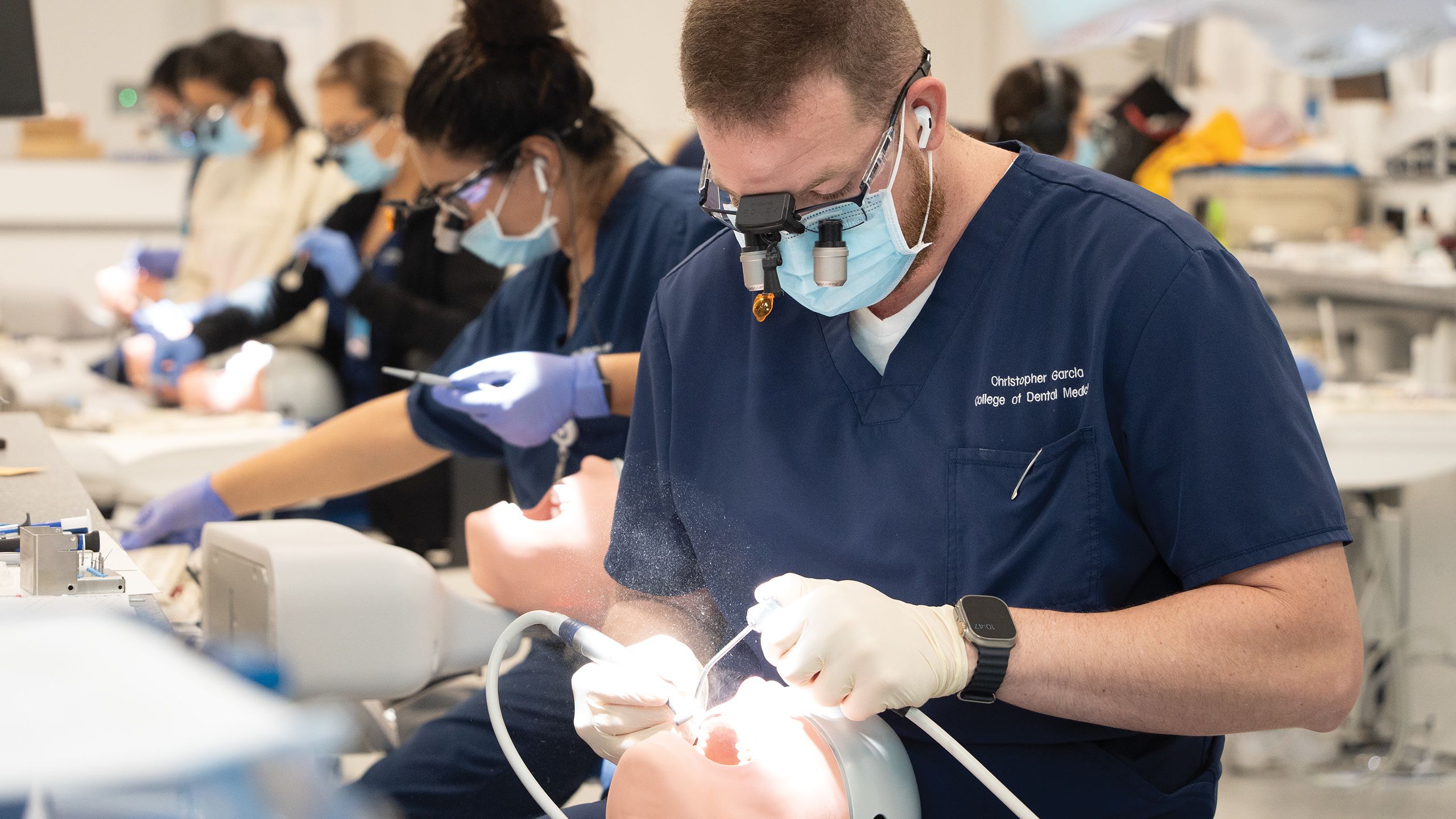
Saving Our Seas
Climate change, overfishing, and habitat destruction cause the loss of marine life, which in turn harms our oceans. NSU researchers at the Halmos College of Arts and Sciences and the Guy Harvey Oceanographic Research Center work with partners to restore coral reef ecosystems, conserve sea turtles, and protect sharks and other marine life.
SAVE TURTLES, SAVE OCEANS
For more than 100 million years, sea turtles have maintained the health of the world’s oceans. These sea creatures control prey such as jellyfish, eat sponges that compete for space in reefs, and deposit nutrients that nourish dune vegetation. Derek Burkholder, Ph.D. from the NSU Halmos College of Arts and Sciences, directs the sea turtle conservation program with colleagues and partners, including the Broward County Sea Turtle Conservation Program. The team searches for nesting behavior along Broward’s 24 miles of beach, tracks eggs, protects nests, and educates the public.
DISTINCTIONS:
- Treated more than 6,000 corals infected by stony coral tissue loss disease
- Sequenced the genomes of endangered shark species
- Protected sea turtle nesting population for the past 30 years
SHARKS PROTECT OUR ECOSYSTEM
Sharks get a bad rap. A misunderstood species because of TV shows and movies, these top-of the- food-chain predators are critical to balancing our fragile marine ecosystem. To conserve sharks for generations to come, Mahmood Shivji, Ph.D., a research scientist and professor at the NSU Halmos College of Arts and Sciences and the NSU Guy Harvey Oceanographic Research Center is tagging and tracking shark movements, collecting DNA fin data, and studying migration, reproduction, and habitat requirements.
DID YOU KNOW? 100 million sharks are removed from the ocean annually because of overfishing.
BREATHING NEW LIFE INTO CORAL REEFS
Coral reefs, threatened by climate change and emerging chemicals of concern, are being revitalized thanks to NSU researchers. Abigail Renegar, Ph.D., a research scientist in the NSU Halmos College of Arts and Sciences, and colleagues grow corals on and off shore in nurseries that are then transplanted to coral reefs.
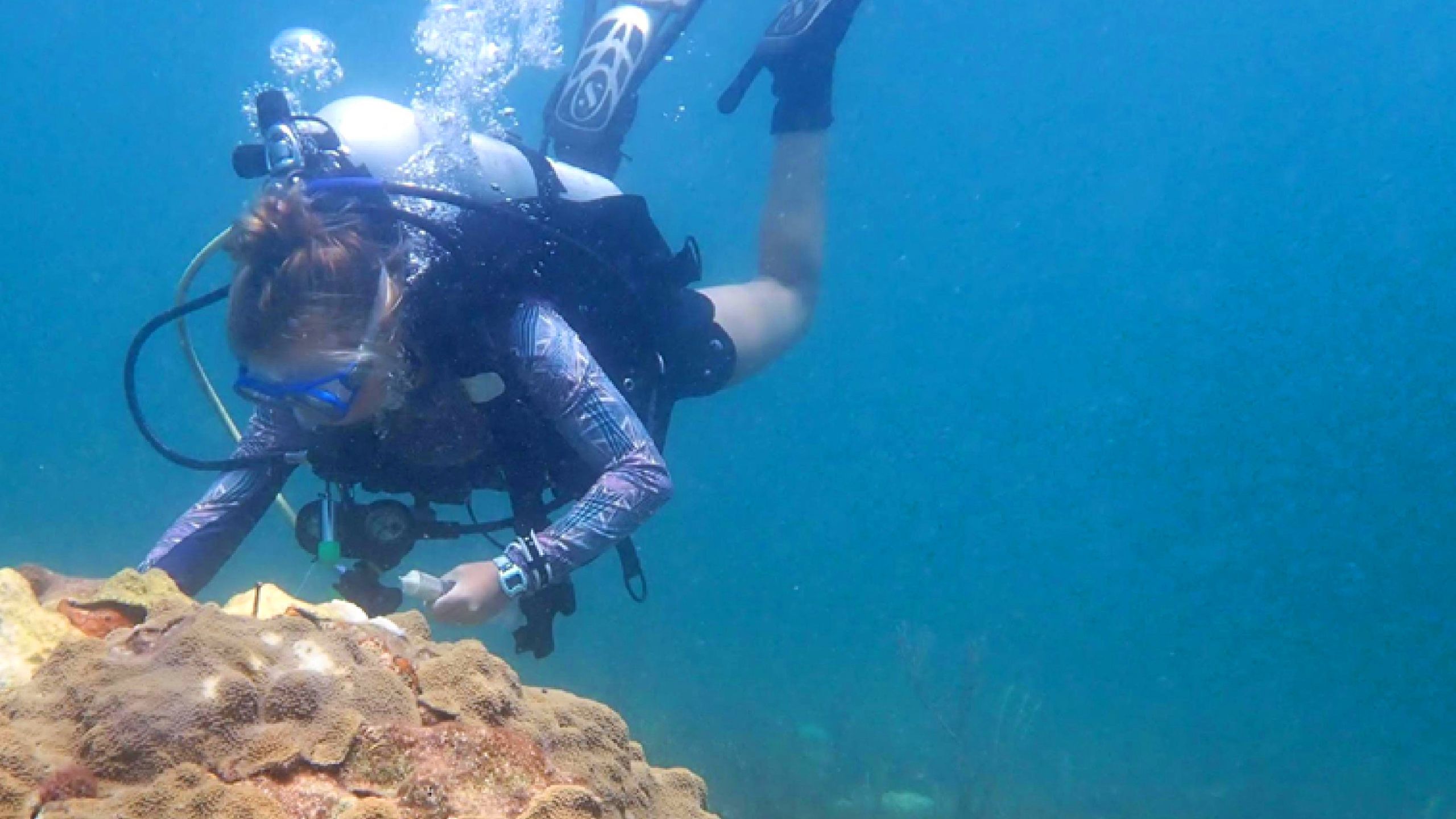
Tackling Some of the Toughest Problems in Society
Stress, suicide, and depression are not easy to talk about. NSU researchers take the stigma out of mental health by collaborating with communities to research issues and develop programs to help ease the pain.
HELPING YOUTH AGING OUT OF FOSTER CARE
Foster youth aging out of the foster care system struggle with finding jobs and establishing a life on their own. Galaxina Wright, Ph.D., assistant professor in the NSU College of Psychology, helps by developing job search workshops in partnership with the FLITE (Fort Lauderdale Independence, Training & Education) Center. The training helps young people search for jobs, plan for careers, and network. The team also provides support for coping with stress and managing anxiety, a common and serious mental health concern among foster care youth.
BY THE NUMBERS: 391,098 kids in foster care in the U.S.
PREVENTING SUICIDE IN YOUTH
To combat increased rates of suicide, Scott Poland, Ed.D., a professor in the NSU College of Psychology and director of the Suicide and Violence Prevention Office, received a grant from the Florida Blue Foundation to develop a toolkit for school educators, often the first line of defense in recognizing suicide crises in students.
BY THE NUMBERS: In 2022, an estimated 49,449 people died by suicide, which is 3% higher than the rate in 2021.
TINY TOTS TRANSITION TO HOME
Parents of infants treated in the neonatal intensive care unit at hospitals frequently suffer from higher rates of depression and anxiety than the general population. Raquel Garcia, SLP.D., CCC-SLP, CLC, CNT, NTMTC, BCS-S, assistant professor in NSU’s Dr. Pallavi Patel College of Health Care Sciences, has been awarded a grant to improve parent-child attachment and reduce parental stress. Garcia and colleagues are collaborating with the HCA University Hospital Neonatal Intensive Care Unit and several colleges in the NSU Health Professions Division.
MENTAL HEALTH FIRST AID
With a more in-depth understanding of mental health issues, educators everywhere can help reduce stigma and foster necessary support. Christi M. Navarro, Ph.D., assistant professor at the NSU Dr. Kiran C. Patel College of Osteopathic Medicine, in partnership with the United Way of Broward County, aims to increase mental health literacy among NSU faculty, staff, and students. Her team will conduct training called Mental Health First Aid and assess the effectiveness of the program.

Improving the Lives of People Affected by Neurological Disorders
ROLE OF DIET IN WOMEN WITH ALZHEIMER’S DISEASE
Two-thirds of Alzheimer’s patients are women, and greater longevity alone does not explain why. Benedict C. Albensi, Ph.D., from NSU’s Barry and Judy Silverman College of Pharmacy, and Co-PI Lisa S. Robison, Ph.D., from NSU’s College of Psychology, have received a National Institutes of Health grant to dig into reasons for the disparity. The team is exploring whether a high-fat diet, obesity, and diabetes worsen the pathology seen in Alzheimer’s disease.
LIFESTYLE EFFECTS ON THE BRAIN
A lack of effective treatments for various neurological disorders such as addiction, mood disorders, and dementia fuels the research of Lisa S. Robison, Ph.D., assistant professor of neuroscience in the Department of Psychology and Neuroscience. Robison and colleagues are studying whether lifestyle factors such as diet are influencing these disorders and, if so, what changes can be made to prevent, delay, or treat these neurological ailments.
SUPPORT FOR STUDENTS WITH AUTISM SPECTRUM DISORDER
While many students diagnosed with Autism Spectrum Disorder display academic and creative talents, others can find life challenging when it comes to navigating social environments and applying problem-solving skills. Melissa M. Tovin, PT, Ph.D., CEEAA, PCS, professor at the NSU Dr. Pallavi Patel College of Health Care Sciences, is providing virtual exercise programs, coaching, and wellness kits geared to the unique needs of adolescents to young adults. Tim Scala, Psy.D., associate professor and Maribel Del Rio-Roberts, Psy.D., associate professor at the NSU Abraham S. Fischler College of Education and School of Criminal Justice, are training NSU staff and faculty on strategies that support students in a higher education setting. All projects were funded by the Robert E. Dooley Trust NSU Center for Autism Endowment Fund.
DO NEGATIVE THOUGHTS AFFECT STRESS AND INFLAMMATION?
Researchers are exploring the role of mind wandering, especially negative thoughts, on inflammation during chronic periods of stress. Jonathan Banks, Ph.D., associate professor, and collaborator Jaime Tartar, Ph.D., professor and department chair in the NSU College of Psychology, have been awarded a National Science Foundation grant to identify the role of mind wandering in stress, inflammation, and cognitive function. The team has collected baseline data from medical and law students who experience a great deal of stress from challenging curricula and exams. Results from this work may lead to targeted behavioral interventions to reduce stress and associated inflammation.
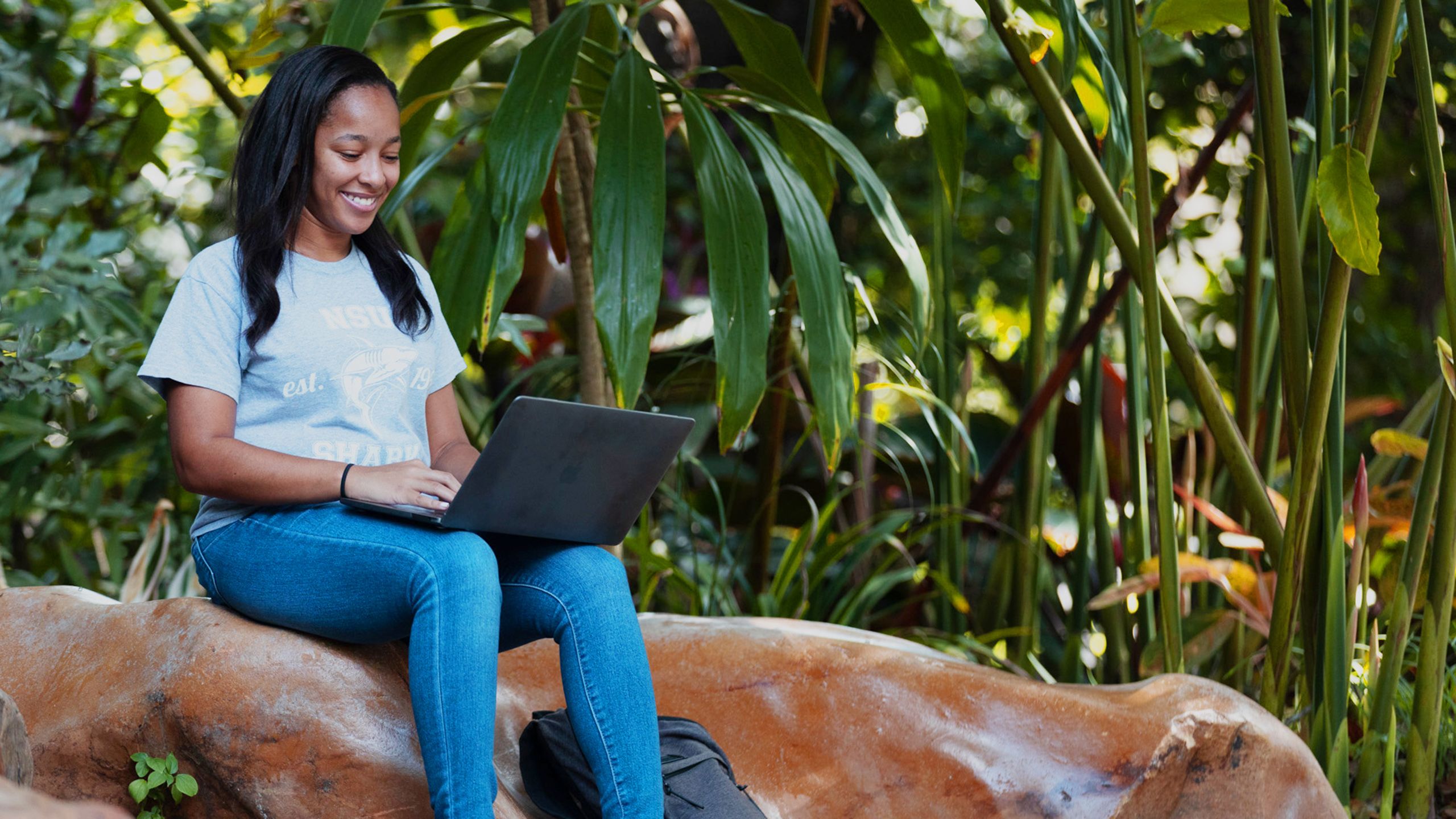
Clinical Research
BRIDGING CLINICAL PRACTICE AND RESEARCH FOR PATIENTS WITH ALS
Led by Eduardo Locatelli, M.D., M.P.H., the new David and Cathy Husman Neuroscience Institute at NSU Health was established to study and treat patients of Amyotrophic Lateral Sclerosis (ALS), known as Lou Gehrig’s Disease. Through the clinic, patients and their caregivers receive expert care for ALS as well as Alzheimer’s disease and Parkinson’s disease. Patients can participate in clinical research involving drug trials and other efforts. Researchers are working to find a cure for these debilitating conditions. The institute was made possible by a $10 million pledge from David Husman, in memory of his wife Cathy.
HELPING GULF WAR VETERANS RECOVER
A major condition affecting Gulf War veterans is a cluster of medically unexplained chronic symptoms, including fatigue, headaches, joint pain, and indigestion. Nancy Klimas, M.D., assistant dean at the NSU Dr. Kiran C. Patel College of Osteopathic Medicine and director of the Institute for Neuro-Immune Medicine, and Amanpreet Cheema, Ph.D., assistant professor in the Dr. Kiran C. Patel College of Osteopathic Medicine have received funding to collaborate on a national study investigating a low glutamate diet as treatment for “Gulf War Illness.” Glutamate is released in veterans post war because of neurotoxin exposure. Cheema explores carefully selected bioactive agents and dietary interventions to correct the biology involved.
Data Science and Cybersecurity
RECOGNIZED FOR EXCELLENCE IN CYBER RESEARCH
NSU’s College of Computing and Engineering has been designated a National Center of Academic Excellence in Cyber Research for its doctoral programs through academic year 2028. The program’s criteria validate that NSU will contribute to the protection of the national information infrastructure and address the critical shortage of professionals with cybersecurity skills.
ADDRESSING THE WEAKEST LINK IN CYBERSECURITY BREACHES
As cyberthreats grow and transform at a rapid pace, organizations race to prevent attacks. Yair Levy, Ph.D., professor of information systems and cybersecurity, researches how human factors, such as employees innocently clicking on email scams, can be prevented. He is developing advanced tools to measure cybersecurity skills, human errors, and insider threats. His research will help organizations with email compromise, social engineering and phishing, cyberthreat mitigation, and cybersecurity risk management.
Leadership and Advocacy
MANAGING ACROSS CULTURES AROUND THE WORLD
Bahaudin Mujtaba, D.B.A., professor in the H. Wayne Huizenga College of Business and Entrepreneurship, won a Provost’s Research and Scholarship Award in 2023. With an extensive publication record and thousands of citations covering topics such as business, change, culture, ethics, and diversity, he has collaborated with more than 50 coauthors. During the past 30 years, he has worked with managers and human resource professionals in nearly 20 countries. This diverse exposure has provided him with insights in cross-cultural management from the perspectives of various firms, groups, and cultures.
PEACEBUILDING FOR CONFLICT-AFFECTED REGIONS
A native of Rhodesia (now Zimbabwe), Ismael Muvingi, Ph.D., professor in the NSU Halmos College of Arts and Sciences, studies human rights, African politics, and transitional justice with a special focus on Africa. A lawyer and academic, he has published a book, “Oil, Diamonds and Human Rights in the Marketplace,” as well as scholarly articles on Zimbabwean politics and on transitional justice. His dissertation was a comparative study of the Conflict Diamonds Campaign and the Capital Market Sanctions Campaign (on Sudan) in the U.S.
Guy Harvey Oceanographic Center
Guy Harvey Oceanographic Center
World-Class Research Facilities Excite Discoveries
Eradicate Cancer, Save the Seas, and Find New Treatments for Diseases
As the university expands its vision to improve lives and protect the seas, NSU research facilities fuel creativity and discovery. NSU scientists have access to advanced and innovative technologies to foster solutions in health care and biotechnology, as well as environmental, life, and social sciences. They are leading hundreds of basic, applied, and clinical research projects to improve patient care, make new drug discoveries, reduce mental health disorders, and examine the forces that affect our oceans.
NOTEWORTHY RESEARCH INSTITUTES AND CENTERS
6 research institutes reducing the burden of disease
- AutoNation Institute for Breast and Solid Tumor Cancer Research
- David and Cathy Husman Neuroscience Institute at NSU Health
- Institute for Neuro-Immune Medicine
- Marilyn Segal Early Childhood Studies Center
- NSU Cell Therapy Institute
- Rumbaugh-Goodwin Institute for Cancer Research
5 research institutes saving the seas
- Broward County Sea Turtle Conservation Program
- Guy Harvey Research Institute
- Institute for Natural and Ocean Sciences Research
- National Coral Reef Institute
- Save Our Seas Shark Research Center
CENTER FOR COLLABORATIVE RESEARCH
Center for Collaborative Research
Center for Collaborative Research
- 215,000 square feet of high-quality scientific equipment and shared collaboration space to spur discoveries
- 6 stories equipped with wet and dry labs, advanced research technologies, and high-performance computing
- 5 core facilities that include genomics, flow cytometry, cell therapy, and imaging available to all NSU research programs and partners
- $100 Million investment in Broward County
Enriching the Next Generation of Leading Researchers
Programs Boost Student and Faculty Research
Faculty researchers support student success through mentorship to cultivate the next generation of scholars and professionals. NSU students engage in complex societal issues, explore their intellectual curiosities, and make a meaningful impact on society.
UNDERGRADUATE RESEARCH TRAINING INITIATIVE FOR STUDENT ENHANCEMENT (U-RISE)
Supports undergraduate students intending to pursue a Ph.D. or M.D./Ph.D. in STEM disciplines related to biomedical sciences or health with a special focus on chronic disease, funded by the National Institutes of Health
PRESIDENT’S RESEARCH GRANT
Provides internal seed funding for faculty to conduct new research, expand existing research, and support scholarly activities
GRADUATE RESEARCH FELLOWSHIP
Supports students who are high-achieving scientists pursuing full-time research-based master’s and doctoral degrees in STEM education
RAZOR’S EDGE RESEARCH SCHOLARS PROGRAM
Offers students practical experiences beyond the classroom through innovative cocurricular projects and opportunities in a four-year residential program
QUALITY OF LIFE GRANT
Supports faculty scholarship in applied research to improve the quality of life in Broward, Miami-Dade, and Palm Beach Counties. Categories include: autism; adults, children, and families; criminal justice; elderly services; and foster care, among others.
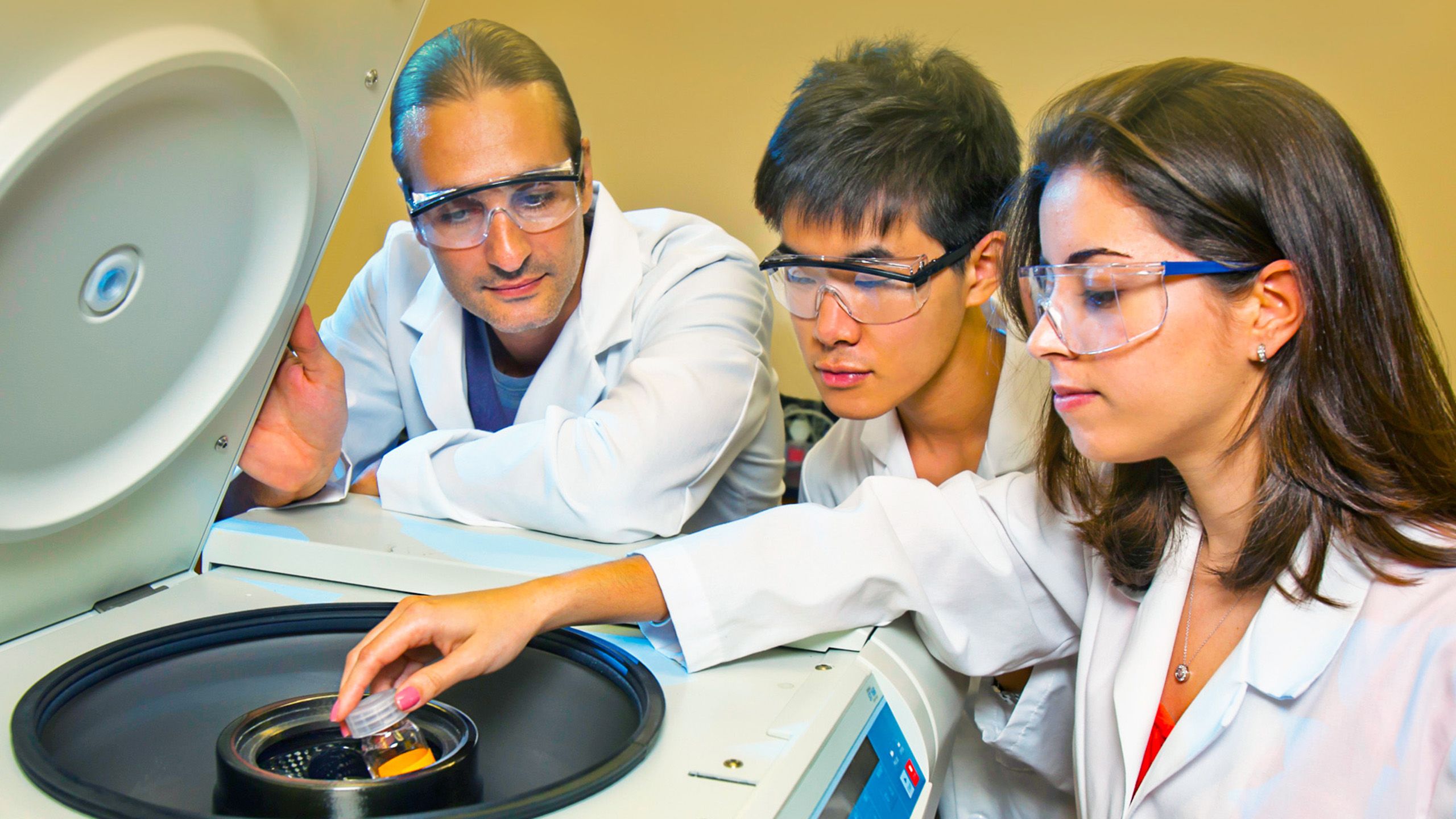
YOUSEF ALHARBI
Third-year student pursuing a Ph.D. in molecular medicine and pharmacogenomics at the Barry and Judy Silverman College of Pharmacy
When Yousef Alharbi first came to NSU, he met Jean Latimer, Ph.D., director of the NSU AutoNation Institute for Breast Cancer Research and Care, who teaches courses related to genomics and breast cancer. He was inspired to learn how the genes inside the cell pathways may affect the treatment and progression of the disease. Based on a report that found a high percentage of Black women in South Florida with advanced breast cancer, Alharbi studies the effects of arsenic and glyphosate on breast tissue of Black women and non-Hispanic white women.
KRISTY LUDY
Fourth-year student pursuing a Ph.D. in nursing education at the Ron and Kathy Assaf College of Nursing
New to research when she started at NSU, Kristy Ludy intends to earn a Ph.D. to conduct research that will improve nursing programs. A clinical assistant professor of nursing at Indiana University—South Bend, Ludy works with a colleague to research how the size of clinical groups and the timing of clinical shifts affect student learning outcomes, satisfaction, and program outcomes. Building on that study, Ludy’s dissertation study will explore the experiences of baccalaureate students regarding their preparation for the newly implemented format.
CHARLEE MUSIAKIEWICZ
Second-year B.S. Elementary Education student with a minor in Research Studies with plans to earn an M.S. and a Ph.D. in learned sciences at the Abraham S. Fischler College of Education and School of Criminal Justice
Charlee Musiakiewicz came to NSU as a marine biology major. Her horizons shifted to elementary education to inspire the younger generation about the importance of research. As a participant in Hochberg- Miniaci Razor’s Edge Scholars Program, Musiakiewicz is mentored by Hui Fang Huang (Angie) Su, professor in the Department of Education. They conduct research to increase STEM education for high school students, working with the Somerset Preparatory Academy Charter School in North Lauderdale. Musiakiewicz and Su will present their findings at the University of Oxford in London.
NSU Research by the Numbers
RESEARCH AND DEVELOPMENT EXPENDITURES RANKING
|
Institution |
Rank |
|---|---|
|
Morehouse School of Medicine |
64 |
|
Marquette University |
65 |
|
Catholic University of America |
66 |
|
Chapman University |
67 |
|
Nova Southeastern University |
68 |
|
Teachers College, Columbia University |
69 |
|
Illinois Institute of Technology |
70 |
|
Embry-Riddle Aeronautical University |
71 |
|
Creighton University |
72 |
|
Villanova University |
73 |
|
Albany Medical College |
74 |
|
Tuskegee University |
75 |
|
Clarkson University |
76 |
|
Fordham University |
77 |
|
By Private Institutions |
|
ANNUAL RESEARCH EXPENDITURES*
FY23 AWARDS BY FUNDING SOURCE
FY23 AWARDS BY ACADEMIC UNIT
|
Other Colleges, Centers, and Divisions |
|
|---|---|
|
Health Professions Division, Clinic Admin. |
$9,500,000 |
|
College of Computing and Engineering |
$7,096,092 |
|
College of Allopathic Medicine |
$5,044,694 |
|
Levan Center of Innovation |
$4,692,723 |
|
College of Pharmacy |
$3,645,565 |
|
College of Psychology |
$3,517,037 |
|
Office of the Provost/Academic Affairs |
$2,906,630 |
|
College of Nursing |
$1,762,621 |
|
Division of Clinical Operations |
$935,999 |
|
College of Education and School of Criminal Justice |
$747,628 |
|
College of Health Care Sciences |
$512,479 |
|
NSU Art Museum |
$502,634 |
|
College of Optometry |
$385,805 |
|
Division of Research and Economic Development |
$190,325 |
|
College of Business and Entrepreneurship |
$110,170 |
|
Honors College |
$100,000 |
|
College of Law |
$75,000 |
|
Library, Research, and Information Technology Center |
$16,000 |
Division of Research and Economic Development
Nova Southeastern University
3300 S. University Drive
Fort Lauderdale, FL 33328-2004
research.nova.edu


